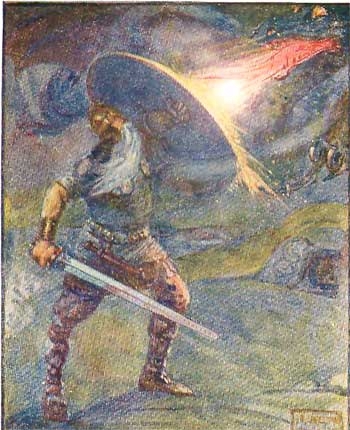Introduction
Translation
Recordings
This Section's Structure
Fate and the Scop's Story
Closing
Introduction
Beowulf launches his first attack against the dragon this week:
Back To Top
Translation
"He stood firmly against the towering shield
the lord of the dear people, when the serpent
coiled himself quickly together; he waited in arms.
Then it went gliding along coiled and burning,
hastening to his fate. The shield well protected
being and body of the renowned prince
for a lesser time than his purpose required,
it seemed that he for the first time that day
would have to prevail, though fate had not decreed for him
triumph in battle. The lord of the Geats swung up
his hand, the terrible one in its varied colors
was struck by the mighty heirloom, yet the edge failed
gleaming on the bone, bit less strongly
when the king of a people had need of it,
oppressed by afflictions."
(Beowulf ll.2566-2580a, Ch.XXXV)
Back To Top
Recordings
Old English:
Modern English:
Back To Top
This Section's Structure
The most interesting part of this section is its structure.
Why does the poet/scribe first say that fate ill-served Beowulf that day? Probably because In normal circumstances a wound that went to the bone would mean certain defeat. Unless the poet/scribe is presenting this work to people familiar with berserkers, who'd probably shrug that kind of cut off with a "'tis but a scratch!"
Placing the statement about Beowulf not having the favor of fate in this fight before noting that his strike cuts to the bone, makes it clear that such a wound is not what he was hoping for.
In fact, given the poor reception that his strike has, the fact that Beowulf's sword "bit less strongly/when the king of a people had need of it," ("bat unswiðor/þonne his ðiodcyning þearfe hæfde" (ll.2578-9)) it seems that he was aiming for one of the dragon's vital organs, hoping to simply stick his sword up and cut the thing as it flew overhead.
What's really remarkable about this tactic is that it's incredibly similar to Sigurd's in the Völsunga Saga. In this version of his story he hides in a trench and basically sticks his sword up into the dragon's belly as it slithers overhead, thus killing it.
Back To Top
Fate and the Scop's Story
Because the fight between Beowulf and the dragon is paralleled by the scop's song about Sigemund and the dragon after Beowulf has defeated Grendel, it's tempting to think that at this late part of Beowulf's story, his fate is revealed in the Siegfried story.
In a way it is. Sigemund faces the dragon but defeats him alone. Mention is made of Fitela (Sinfjötli in the Völsunga Saga), but only to say that he isn't present (Beowulf ll.889). Fitela's parallel is present in Beowulf's fight with the dragon as Wiglaf, whose parentage seems quite removed from Beowulf (unlike Fitela, who is the son by incest/nephew of Sigemund).
What differs between the two dragon stories, and where the parallel structure begins to break down, is that Beowulf does not live through the fight and the help of his companion is necessary. Perhaps that's what happens when a mortal tries to go against fate. Or, maybe, we as listeners are meant to take the poet/scribe's words as having a negative meaning: Fate didn't decree triumph for Beowulf, it instead decreed defeat.
Back To Top
Closing
Next week check back here on Tuesday for Isidore of Seville's continuing description of cattle and move into buffalo, and on Thursday for the dragon's reaction to Beowulf's attack and its dire consequences.
Back To Top

No comments:
Post a Comment